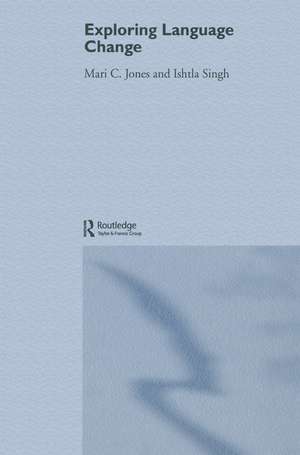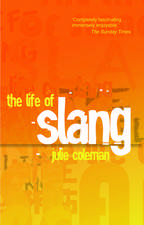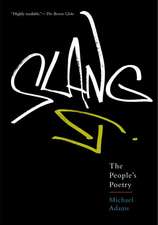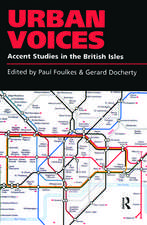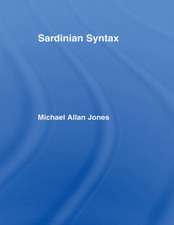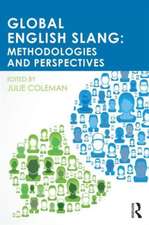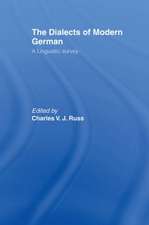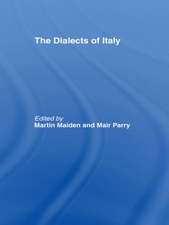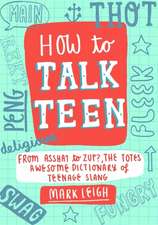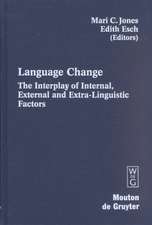Exploring Language Change
Autor Mari Jones, Ishtla Singhen Limba Engleză Hardback – 17 noi 2005
Presenting new or little-known data, the authors draw a distinction between "unconscious" and "deliberate" change. The discussion on "unconscious" change considers phenomena such as the emergence and obsolescence of individual languages, whilst the sections on "deliberate" change focus on issues of language planning, including the strategies of language revival and revitalization movements. There is also a detailed exploration of what is arguably the most extreme instance of "deliberate" change; language invention for real-world use.
Examining an extensive range of language situations, Exploring Language Change makes a clear, but often ignored distinction between concepts such as language policy and planning, and language revival and revitalization. Also featured are a number of case studies which demonstrate that real-life language use is often much more complex than theoretical abstractions might suggest.
This is a key text for students on a variety of courses, including sociolinguistics, historical linguistics and language policy and planning.
Preț: 260.89 lei
Preț vechi: 311.88 lei
-16% Nou
Puncte Express: 391
Preț estimativ în valută:
49.92€ • 52.26$ • 41.31£
49.92€ • 52.26$ • 41.31£
Carte tipărită la comandă
Livrare economică 05-19 aprilie
Preluare comenzi: 021 569.72.76
Specificații
ISBN-13: 9780415317740
ISBN-10: 0415317746
Pagini: 228
Ilustrații: 2 line drawings
Dimensiuni: 156 x 234 x 19 mm
Greutate: 0.5 kg
Ediția:1
Editura: Taylor & Francis
Colecția Routledge
Locul publicării:Oxford, United Kingdom
ISBN-10: 0415317746
Pagini: 228
Ilustrații: 2 line drawings
Dimensiuni: 156 x 234 x 19 mm
Greutate: 0.5 kg
Ediția:1
Editura: Taylor & Francis
Colecția Routledge
Locul publicării:Oxford, United Kingdom
Public țintă
UndergraduateCuprins
1. Introduction 2. Discussion 3. Language Birth 4. Language Death 5. Language Planning 6. Language Revival 7. Language Invention. Bibliography. Useful Websites
Recenzii
'Informative and eminently readable, the book covers most of the ground one would expect in an introductory work, using a refreshing mix of well-known and less familiar examples. The book is neatly structured, its seven chapters following a logical sequence and guiding the reader almost seamlessly through the separate stages of a well-developed argument. While all the chapters are self-contained and the reader may 'dip in' at any point, this is one linguistics textbook which reads well from cover to cover.' – The Linguist List
'This book on a much-debated topic opens up a number of significant new perspectives ... an erudite and user-friendly volume which presents a wealth of new data. It is likely to be widely welcomed.' – MLR
'This book is a handy and useful reference to the processes of language change and the social, political, educational and economic change it invariably includes.' – BAAL News
'This book on a much-debated topic opens up a number of significant new perspectives ... an erudite and user-friendly volume which presents a wealth of new data. It is likely to be widely welcomed.' - MLR
'This book is a handy and useful reference to the processes of language change and the social, political, educational and economic change it invariably includes.' - BAAL News
'This book on a much-debated topic opens up a number of significant new perspectives ... an erudite and user-friendly volume which presents a wealth of new data. It is likely to be widely welcomed.' – MLR
'This book is a handy and useful reference to the processes of language change and the social, political, educational and economic change it invariably includes.' – BAAL News
'This book on a much-debated topic opens up a number of significant new perspectives ... an erudite and user-friendly volume which presents a wealth of new data. It is likely to be widely welcomed.' - MLR
'This book is a handy and useful reference to the processes of language change and the social, political, educational and economic change it invariably includes.' - BAAL News
Descriere
Presenting new or little-known data, the authors explore the phenomenon of language change, highlighting an often ignored distinction between concepts such as language policy and planning, and language revival and revitalization movements.
